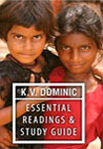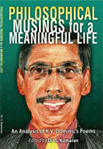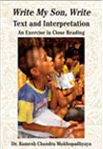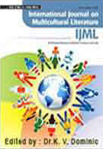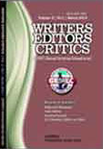Books Review in Detail
Review Of Dr. D. C. Chambial’s Review Article on K. V. Dominic’s Write Son, Write
Dr. D. C. Chambial’s Review Article On Write son, Write
Review Article
K. V. Dominic—A Humanitarian in Conception and Socio-Consciousness: An Analytical Study of Write Son, Write
Dr. D C Chambial
K. V. Dominic’s second poetic collection, Write Son, Write is a collection of 31 recent poems. The poems have cartoon illustrations by Mr. K. K. Anas.
Love for God’s Creation
The first poem, ‘Write, My Son, Write,’ that gives title to the book, is a long poem in 21 parts: Part One exhorts the poet to write because He has created him with this purpose. In Part Two, the God asks him if he doesn’t feel “the symphony / of the universe” and tells him that while animals and plants dance to His music, man doesn’t. Part Three tells that all creatures and objects live in harmony with Nature. Part Four tells as all parts of human body work in harmony so do all creations. Part Five informs about man’s “discordant notes” with nature. Part Six is about the harmonious existence of all animate and inanimate things in this world while man’s mind makes all the difference. Part Seven implies that God has created other things: plants animals and nature for man’s company but man is bent upon destroying them. Part Eight tells about man as God’s latest and intelligent creation. Part Nine exhibits man’s folly in considering himself “the master / of all wisdom.” Despite his celestial qualities he prefers to foster “hate and violence;” and shows “no mercy / to animals and plants.” Part Ten tells that man for his jovial festivities kills animals to devour them and feel happy. While Part Eleven again exhorts man to learn from nature to live in harmony, Part Twelve tells to expose human deficiencies and imbibe God’s “symphonies.” Part Thirteen is about God’s love for man; even thunder is not his wrath. Part Fourteen is about God’s granting man His “reason / [not] to learn / my [His] plans.” Part Fifteen is about God’s love for man like all other creatures and things of this universe, but asks the poet to tell man that he “needs humanity.” Part Sixteen is about man’s position in this world: he is one among other creations to live happily and harmoniously and not exploit and mislead others. This part introduces readers to three types of existent mafia: religious, political, and intellectual. Part Seventeen is about “religious mafia” that misguides common men that He is loves flattery, hymns, money, and jewellery that men offer in their places of worship. Instead, “karma is the best prayer;” and service unto humanity the best service of God. Part Eighteen is about vegetarianism: God has created man as herbivorous but he kills animals living on land, sky and in water for his food. Part Nineteen is about political mafia that “exploits masses; / dictates, strategies / and makes them slaves”. Part Twenty tells about intellectual mafia that “assume [to be] omniscient,” deludes and diverts common man’s mind from God, the Supreme Creator, and imposes his pseudo philosophies on them. Here the poet also shows that religious and intellectual mafias are one and the same without any difference. Part Twenty-One is the crux of the poet’s “views and philosophy” of life in this poem: if and only if man learns to live in harmony with nature and His creations, he has the possibility of survival; if his exploitation of humanity and Nature continues, nothing can save him. This poem exhibits poet’s love for all creatures and Nature.
Elegy
The second poem, ‘An Elegy on My Ma’ (38-41), is based on his emotions for his mother after her death on 14 October 2010. It is a poem that tells about mother’s suffering in her old age when she suffered from “old age ailments” accompanied with breathing problem. He tells about her life that she brought up her brothers and sisters about the death of her parents; hard labour in farm from “Dawn to dusk.” Mother’s live is all pure without any dross: “Truly mother’s love / is the purest love.” In her acute suffering, she often cried: “Why doesn’t God / call me back?” ultimately she is confined to bed and lives without food. The poet also laments that, because of his job responsibilities, he could not be by her side when she called for her children and wanted them to sing. Now he feels deserted after her death. The poem ends with complete surrender to Him: “Surrender unto Him / who created you.” The poem is replete with tragic pathos.
Poems about India
There are two poems: ‘Victory to thee, Mother India!’, and ‘Rocketing Growth of India,’ that tell about India. The first one (42-43) sings praises for fostering uniting in people of varied cultures, religions, races and speaking different languages: it sings of unity in diversity. But now divisive forces sadden Mother India: “Patriotism, nationalism, secularism / give way to / terrorism, communalism, and regionalism.” He asserts the cause: “Matha, I know the cause of your tears: / Religious, political, intellectual mafias / tear thy heart and drink your blood.” In these lines, the poet’s concern for the country as one being weakened by its own people is also manifest. The Indian virtue of harmony in diversity seems at stake at the face of some shenanigans and multi-faceted mafias jeopardize not only her unity but also her very nature. Despite present dismal image, the poet is hopeful that many great men like Tagore, Gandhi and Nehru will be born to redeem her of her present sorrow. The second poem, ‘Rocketing Growth of India’ (77-78) , is a satire on the government’s statistics to show growth vis-à-vis development in India, while the truth is quite contrary to these statistics: “First in population growth; / first in number of poor; / top in ignorance and illiteracy; to in superstition and fundamentalism.” It is the rich, who, in fact, are growing. The death of the poor, at the collapse of a gate of an ashram, who had swarmed there for food is the stark reality that our rulers are averse to see. The poet’s jibe comes alive when he writes:
Had the government granted
half the amount when they were alive;
had the government shown half the love
they shower to the rich,
many such tragedies be averted. (78)
Poems about Animals
The poems like ‘Massacres of Cats’ (44-46), ‘A Cow on the Lane’ (47-48), ‘Crow, the Black Beauty’ (57-58), and ‘To my Deceased Cats’ (97-98) are about animals. ‘Massacre of Cats’ is about the cats that met their death when they were poisoned by the neighbor. It not only teaches the lesson “to love other beings / as fellow beings” and not to serve them. The poet compares the killing of cats to the killing of albatross in ST Coleridge’s Ancient Mariner and pleads for a similar expiation from the killer of cats. ‘A Cow on the Lane’ is adamant to occupy its space on the road which leads to the railway station through which the persona wants to drive and reach the station on time before the trains leaves. The cow doesn’t budge; the persona has to take other route to reach the station. The poet beautifully uses an allusion from Mahabharata when Bhimasena–the great and powerful Pandava–is unable to move the tail of Hanuman lying on his path. ‘Crow, the Black Beauty’ is about a bird that is always detested. None want to hear its caw-caw. The poet wants that crow is also His creation and should have the same love and laudation of the people that cuckoo and dove and such other birds enjoy. He laments: “When will we behold God’s creation / with impartial eyes / and find His beauty in all forms?” (58) ‘To my Deceased Cats’ describes the pain and suffering that the cats, after being poisoned, suffered. It relates its story of previous birth the cat was a human being, a doctor, he had also poisoned a cat that also suffered the same pangs of death. Now the cat thinks its present fate only the result of his action in previous birth. Indirectly the poet teaches the altruistic theory of karma – as you so, so shall you reap; if not in this birth, but must in the next. It concurs with the Hindu view of karmic retribution.
Poems on Hero Worship
The poems like ‘Aung Sun Suu Kyi: Asia’s Lady Mandela’ (53-54), ‘Bravo Katie Sportz!’ (55), ‘Tribute to Mohammed Rafi’ (87), and ‘Wolfgang, the Messiah of Nature’ (93-94) imply poet’s hero-worship. In all these poems, the poet sings the glory of these persons in their respective fields. Aung Sun Suu Kyi has been eulogized as the Mandela of Myanmar. She suffered a lot at the hands of military junta there and spent most of her life in jail. Her suffering didn’t deter her from her crusade to free the country from military junta [now she has been released from jail and won the recent election, held in March 2012, in Myanmar]. Katie Sportz, a 22 year old, is dauntless in her courage and rowed alone in her boat for 4,534 KM in sun and shower braving the sea storms, solitude and desolation in a bid to raise US $ 70,000 fund for the project “Blue Planet Run Foundation, / supplying drinking water round the globe.” The poet is all praise for her and prays: “Let your race fill this planet.” It is his greatest encomium to the “valour of women.” Mohammed Rafi has been a prodigy of Indian singing. When he sang, his notes touched the very cords of heart and mind alike. He died some 30 years back but his music is still alive; nay, it will survive till eternity. The poet/persona likes his songs very much and feels as if Rafi is with him. He feels “his melodies raise us to heaven.” Indeed his voice in his songs has immortalized him. In ‘Wolfgang, the Messiah of Nature,’ the poet sings of Wolfgang, a German by birth, who came to Kerala at the tender age of twenty and since has lived here for more than forty years in the forests of Kerala teaching people how to live in harmony with nature. He lives in the company of dreaded snakes, animals and lovely birds. They do not fear him nor do they cause any harm to him or to his children. Such is his intimacy with Nature. The poem, despite singing Wolfgang’s glory, also teaches that God created everything to live in harmony. It gives not only peace and joy but also brings heavenly bliss for both Man and Nature. The poet calls Wolfgang “Nature’s Christ/ born to redeem Nature.” All human beings should learn a lesson from him how to live in harmony with Nature and save not only earth but also humanity from destruction.
Poems on Nature/Poems on other Themes
Poet’s love for Nature is contagious. While reading his poems, one loves to live in Nature. It is difficult to shift Nature from his poems, yet ‘Coconut Palm’ (56), ‘Nature Weeps’ (71), and ‘Wagamon’ (88) are two typical poems that describe Nature in two different shades. ‘Coconut Palm’ is a short poem and tells the rapid growth of the tree and slender yet very tall. Its “sparkling leaves and alluring nuts” mingle the visual and gustatory senses beautifully. Its tallness, thin stem bearing tons of fruit appears like a “marvel to all architects.” Every part of this tree is used for human welfare. The poet wonders at its mysterious nature. ‘Nature Weeps’ speaks about the havoc that man and his industrialization has brought upon Nature. All trees serve humanity in one or the other way, yet man cuts them to denude earth. Ecological imbalance leads to scarcity of rains: fields turn dry, no crops grow; if it rains, it is full of acid due to emission of poisonous fumes from factories that cause air pollution; flowers wither; birds fail to sing; temperature rises very high; man encroaches upon the land meant for wild beast, so they move towards settlements . . . . In fact, the ecology is totally disturbed. All beauties of Nature have become things of past. Nonetheless, the poet presents a heaven of natural beauty in ‘Wagamon’. Here God’s omnipresence appears in natural beauty: full of greenery, cataracts falling “like white curtains,” uneven texture of land–“mounds after mounds,” clouds, moon and stars seem to abound in “the therapeutic / power of Nature.” The beautiful
Pine valleys of Wagamon
an exotic wild beauty.
Tall and thick pines trees
support firmament
from falling. (89)
Really the tall pine trees present a look of pillars supporting the sky. Here the sun is “always gentle” evening full of “nocturnal music” and “resounding hymns of angels” and the “semi darkness” that falls here at dusk lifts “our minds / to an eternal / abode of repose.” Will there be some other place so beautiful, so soothing and so lively to live on earth? Certainly not.
Tragic Poems
The poems entitled ‘Teresa’s Tears’ (81), ‘To My Colleague’ (83), ‘Train Blast’ (85), ‘Water, Water, Everywhere . . .’ (91) picture human tragedy in various moods. Teresa is a labour-woman who sweeps floors to earn her bread in a school; she is given wages after a year but taken back as donation to the institution as per the condition laid down in the agreement. Her eyes are suffused with happiness to see currency but, at the same time tears represent her helplessness; for, she has to give them and she is left penniless. The poet calls “such forced donation / a canker of Kerala.” The poem, ‘To My colleague,’ is manifestation of irrational religious fanaticism: the poet’s colleague’s [Prof. TJ Joseph’s] hand and leg are hacked, rather severed from his body, on 4 July 2010. None come to his help. Only crocodile tears are shed. The poem is an attack on the right of liberty to do anything that may cause other’s death: “Largest secular state! / Equality, fraternity, liberty. / Liberty to do anything?” ‘Train Blast’ caused by Maoists. He pleads that “diabolic means” should not be used to achieve “Utopian ends.” Though those, who are killed in such blasts are spared off the pains of this world, but those, who they leave behind them, are subjected to endless suffering. The poet, here again, with an allusion for Mahabharata, tries to show his doubt in the existence of all protecting and merciful God: “How can I ease in / sambhavami yuge yuge?”
Still there are poems that have not been mentioned, for space restriction, but equally important and charming that exhibit the poet’s understanding of life around and lend weight to his humanitarian philosophy steeped in contemporaneous societal consciousness making him an advocate of the down-trodden and human values. It is a must read for all those who want to enjoy a good read with some social sanity.
The worst quality of the book is its binding: by the time this review is complete; all its leaves were lying scattered on my writing desk. The publisher should have taken care in its binding; for, the reader doesn’t want to through the pages/book just after reading but also wants to preserve them for his future use.
Work Cited
Dominic, K. V. Write Son, Write. New Delhi: Gnosis, 2011. Print.
Dr. D. C. Chambial, Reputed English poet, critic, short story writer and interviewer, is the Editor of international biannual journal, Poetcrit, Maranda, Himachal Pradesh, India.

